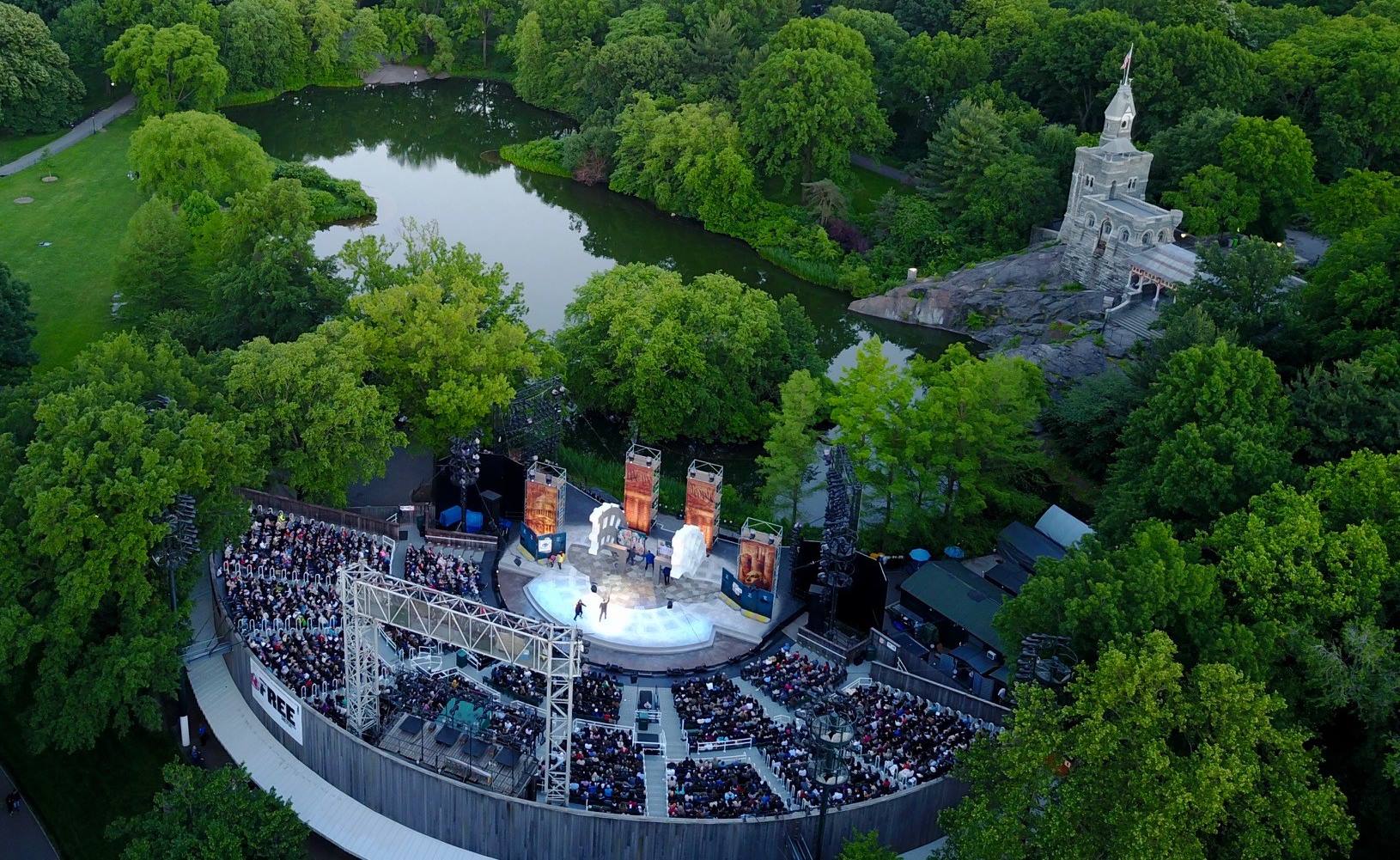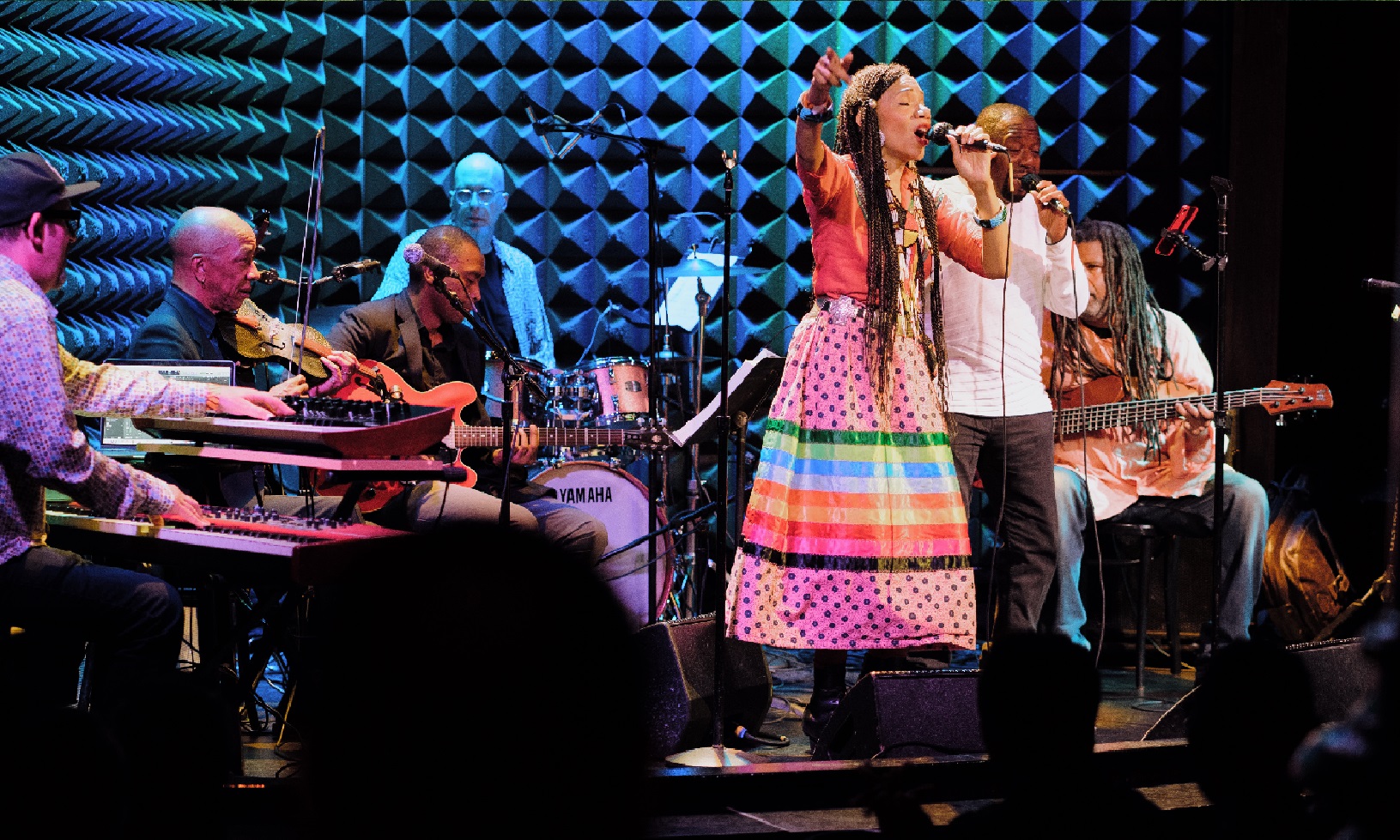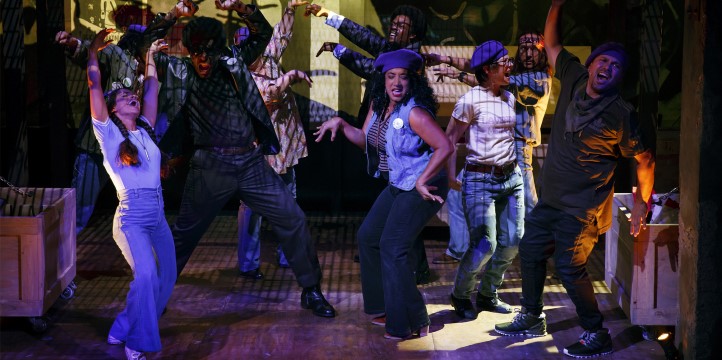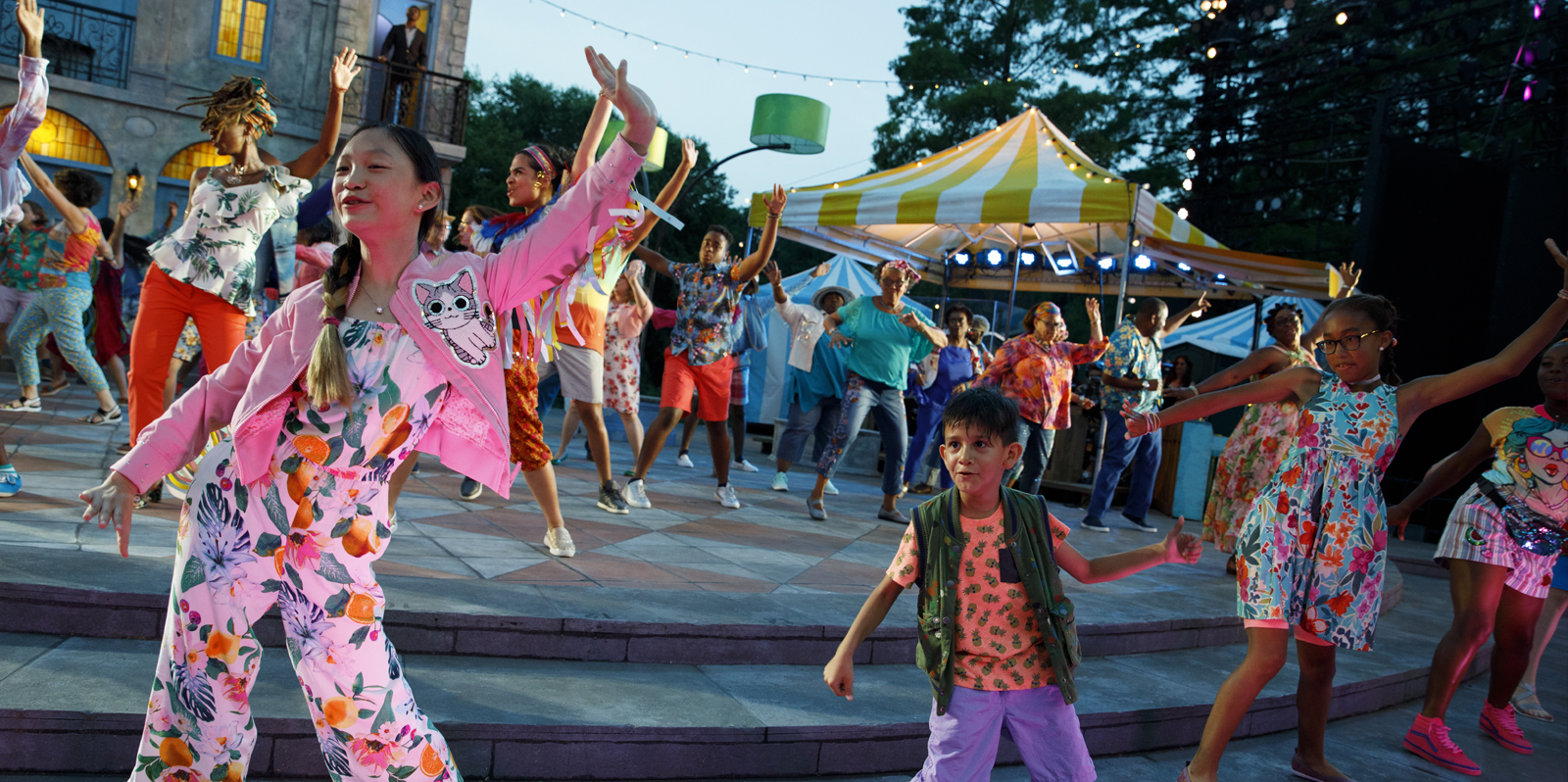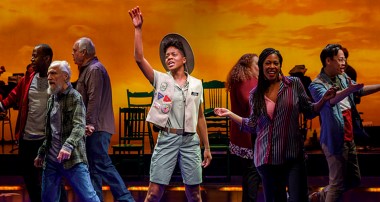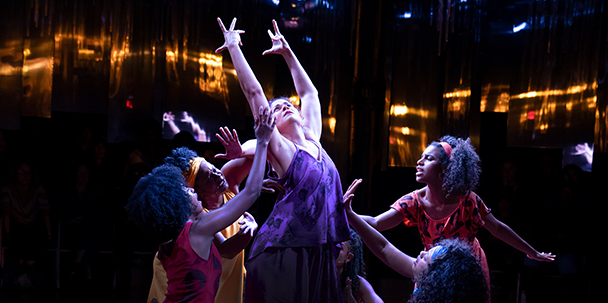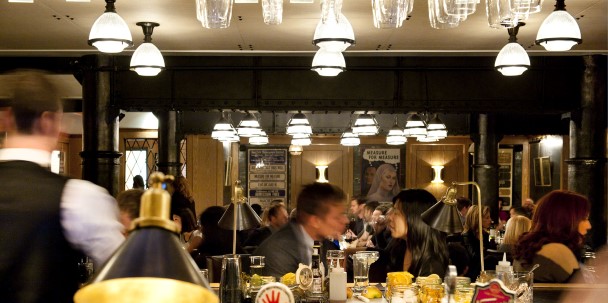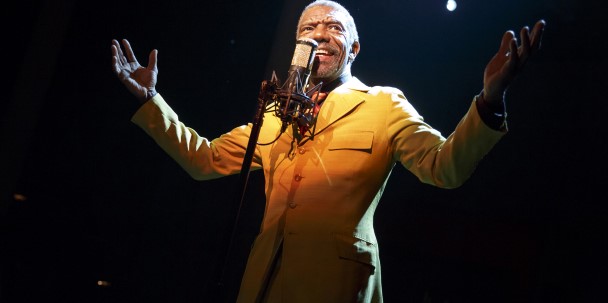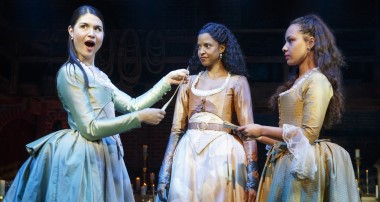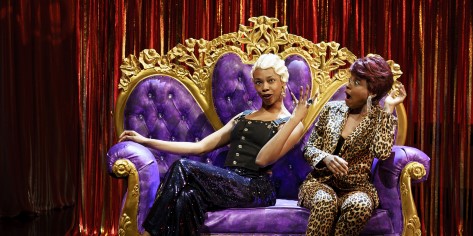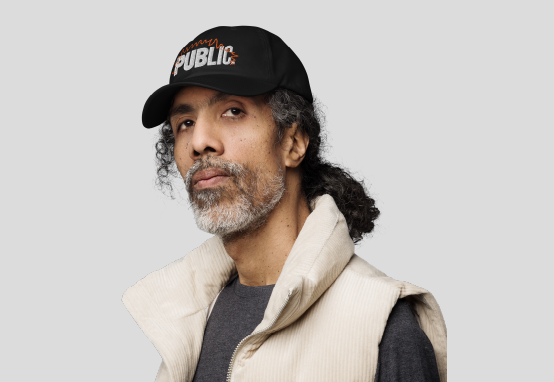[overlapping audio samples play over intro theme]
Kaleda Davis: If a library is free, why not a public theater?
Fernando Masterson: Theater is a practice of—you know, it’s empathy, right? It’s—you’re watching something happen onstage—
Caity Joy: Raccoons are very intelligent creatures.
Jeanine Tesori: Democracy and theater, they have a deep relationship.
Jack Phillips Moore: The reason this is great is because it fundamentally understands what theater is, which is, it’s a place for all of us to come together and appeal to something larger than ourselves.
Reynaldi Lindner Lolong: This is Public Square, a podcast of The Public Theater.
RLL: Hey, Fern.
FM: Hey, Reynaldi. It has been a minute.
RLL: It really, really has. I think our last episode was Soft Power in early May, when the cast recording dropped.
FM: That's right. And to think how much has changed since then, and how, you know, the world has - so much has changed and so little has changed in the same breath, but I I'm really happy that we get to have this moment together.
RLL: Yeah, you know, like in the past, I think now, it's almost been two and a half months. You know, we have seen, in addition to just like wrestling with a pandemic, we really saw the Black Lives Matter movement, really just galvanize and rock, the American theater in all the ways that it should have.
FM: It should have, and that there's so much more to do. You know, I, I think I think that the theatre industry, I mean, the world, I mean, communities all over the world are in this moment right now where, you know, we're realizing that inaction is not enough, and it's not just being active, but it's figuring out how to be active and, you know, well, in the art forms that you're producing, and then the voices that you're handing the microphone to.
RLL: Yeah, and I think what's really been a really great chance for us as a Marketing and Communications team - a little going behind the scenes for our listeners - is that we've been talking a lot about what it means to, you know, pass the mic, to bring in other voices into the conversation, especially when talking about media and journalism and representation. And so on that note, I am super excited to introduce Emily White, our Publications Coordinator, who helped us produce this episode. Hello, Emily.
EMILY WHITE: Hi.
FM: Emily!
EW: It's good to be here.
RLL: Of course, you want to talk a little bit bit about how this particular episode came together?
EW: Yeah, so this episode is in alignment with, in conjunction with our radio play of RICHARD II for Free Shakespeare on the Radio. And it's part of a series of projects that I helped coordinate called our content commissioning series. It's a series of projects that highlight emerging BIPOC and queer journalists, artists, and writers that align with shows we're currently producing. And so this is a conversation with a podcaster named Alec Stephens III, a Shakespeare scholar, Ayanna Thompson and director of RICHARD II, Saheem Ali.
ALEC STEPHENS III: So just to introduce myself really quick, I'm Alec the third. I'm sort of a multi hyphenate. And during this COVID time, for me, it's been a real moment to reflect and I really feel like I've gained a lot of clarity of purpose. One of the questions that I find myself asking is, being a Black man in the arts, being part of the BIPOC community, anything I engage in is somewhat going to deal with issues of being a BIPOC artist. We are interrogating, I think all of us, the whole country, is taking a look within. Kind of, what's next, and what responsibility do we have? How are you doing, Ayana Thompson, Saheem Ali, how are you doing in this moment, right now today?
AYANNA THOMPSON: Today is a good day. You know, there's the ups and downs and it's real. I, as a BIPOC scholar, feel like I am more in demand now than I've ever been before. Every organization I'm affiliated with, whether it's a professional organization, or an arts organization, or my own academic institution, suddenly is like, oh, Black Lives Matter, you might be able to help us with this [laughs]. So, I am also incredibly tired. And the kind of fatigue of the work is real, is real. But, it does mean that there's the potential for change.
SAHEEM ALI: Yeah. It's been, it has been trying. It's been, you know, as a freelance artist, I'm a freelance director, so I work when I'm hired to work. And since no one is doing any hiring for live theater right now, It's been a time of great - a great clearing. And RICHARD II shifted from being production in The Delacorte to being a production on the radio. And so that for me was, you know, at first my heart sank a little bit because it's just, you know, it's just a radio play as opposed to like a full blown production in Central Park with thousands of people. But then the more I went into it, the more I just really appreciated the fact that I could engage with a piece of art right now and with a community of artists and telling a story. So it has been a very, very uplifting kind of rejuvenating moment for me.
ASIII: Everybody in New York is mourning the loss of live theater right now, as the entire country is mourning the loss of live events in general. I think it's really exciting, when I heard about this radio play concept, because I think this time, [it] forces everybody to be innovative. So in order to keep with The Public's mission of making theater accessible, and specifically Shakespeare accessible to a lot of different people, so what's the approach to putting on RICHARD II as a radio play?
SA: Yeah, for me it involves really reimagining the whole piece. Because when you have live theater, there are elements of storytelling that are visible, that are not spoken. So you have costumes, you have scenery, you have props, you have all these components of storytelling, that are, just, that are part of the tapestry of what the world is that you're creating. So, in thinking about audio and all of, everything visual stripped away, anything that can tell you a story in that sense, like missing, I did a deep dive into completely just, like, rethinking the play, just based on what is audible, and what components that are audible are telling a story. So kind of really breaking it down to, starting with the text, of course, the actor speaking. So, how are they speaking? What is their cadence? What do they sound like when they're speaking Shakespeare? - being like, you know, the crucial components. And then on top of that, what is the environment sound like that they're in? Is it abstract? Is it realistic? What is the music that can be heard? Is that realistic in the space? Is it emotional? Is it conceptual? So, really, I reconceived the whole production for just audio being the storyteller, alongside the text, which was something I'd never done before. I've never worked on a radio play. I never even listened to a Shakespeare radio play before this. I kind of, you know, went looking on YouTube, and the only thing I could find were like, you know, British plays from like, the whole, you know, from the, from the ‘60s to the ‘90s. Because they have a deep, deep tradition in the U.K. of continuing radio drama and Shakespeare drama. And in the U.S., the most contemporary piece I could find was an Orson Welles recording of Julius Caesar from the 1930s. I mean, Ayanna, I'm not sure if there are any that are more contemporary than that, but I was - certainly, wasn't able to find them.
AT: No, I think you're absolutely right. And we, we don't have the same kind of rich radio play tradition around Shakespeare in the U.S. And what's exciting for me for your production is, of course, The Public has been at the forefront of thinking about non-traditional casting, and what it looks, what it looks like to have different bodies embody Shakespeare, but I think this could be at the forefront of what does it sound like when you have different bodies, performing Shakespeare? And the centrality of the voice and taking it out of the visual realm for us, when thinking about race in Shakespeare, I think is incredibly important, and also shifts the dialogues that we can have. So I'm just really grateful to you for doing this.
SA: It's been a real journey when you actually think about [it], and a real pleasure to think about, you know, because yeah, race is visible. Is it also audible? You know, can you tell the race of the person when they’re simply speaking? What does that mean? And for me, my approach to that was really to encourage the actors to speak as they do. I said, this is contemporary, so speak as you would contemporaneously. And then, and so they do, and so what you hear are these actors are speaking in the way they speak. And I said, you know, this is not British, we're not setting it in the U.K., I don't want any kind of like, put-on, you know, cadence, which, which just is always, even in live theater, is just, like, grating for me, whenever I hear that, you know, the way you treat Shakespeare like, it's like, you know, it's on a pedestal.
ASIII: I think that that's an interesting thing to talk about: colorblind casting.
SA: Yeah, I think, I think, you know, one of the beautiful things about this moment is that our language is evolving, right? So two months ago, I never said BIPOC, you know?
ASIII: Right.
SA: I said people of color, I said Black people, and now this, like, beautiful umbrella that, like, kind of, you know, leads with Black and Indigenous before people of color that like, you know, honors the differences but saying that we're coming together like that, that there is a collective, you know? That's language that's new. Colorblind casting is something that's like, even that is a relic right now. We don't talk about that anymore. Because once upon a time, it was like, “Oh, I don't see color. I don't see race. I'm blind to it.” Simply not true. So now we talk about color conscious casting. And I think, Ayanna, I read somewhere there’s another phrase to describe it?
AT: Well, I mean, I prefer color conscious casting, but some people are talking about new traditional.
SA: Yes. That was it.
AT: Yeah. And which I think is fine, right? Because it's a kind of bigger umbrella. But I think you're right, Saheem, that the important thing to hit on is that when colorblind casting was first conceived - though it was very revolutionary - but to get that accepted was the, like, “Oh, we don't see race. You don't have to see it.” And I think we're at a place now in the 21st century where if someone says to me, they don't see my race, I'm insulted. [All laugh]. Like, what's wrong with you? So I think we're just in a different place now, where our thinking about what race means, what it matters, how it matters, how it impacts structures that we're in, are all things that are now up for debate, dialogue, contestation, and change. And I think that performance is very central to this, because oftentimes, at least in a live event, and I think it will also happen for the radio event, you're in a space where something shifts and changes. And you can have a conversation with a stranger in the bathroom stall about what she is experiencing on stage, or what she thinks about the racial makeup of the cast, or how it matters to her or doesn't, or whatever. And I think that a radio play, at least in our family, in our homes, we can have those dialogues with our children and perhaps with our neighbors, if they're sitting outside listening to it as well.
ASIII: Technically, how was the process of rehearsing this play during the pandemic?
SA: Everyone was in their own home, and so we rehearsed on Zoom for a week, and then all the actors were responsible for recording themselves as well. So WNYC, shipped them all like, little, like, kits, little microphones, and then we would rehearse like this on Zoom. And then we would record the scenes here on Zoom, but they had their equipment that was actually recording their audio. And then they had to upload that audio into Dropbox after each session, and then an engineer at WNYC would, like, construct everything based on that. And so we didn't get to hear what had actually been recorded until like, you know, after the fact. So it was a very technically involved process. And we had a huge cast: 25 actors, and everyone from an eight year old to a 92 year old, and everything in between.
ASIII: I was familiar with Richard III. Let's talk a little bit about RICHARD II - why that story, or how that story might relate to some things happening right now?
AT: I think RICHARD II is a great play because it's tricky. And it's not, I mean, as you say, like, Richard III is pretty straightforward. Like, he tells you he's a bad guy, and then he is a bad guy, and then he continues to be a bad guy. Like, that's kind of straightforward. RICHARD II has this strange structure, where your emotional relationship to Richard at the beginning of the play changes dramatically to the end, and the same with your relationship to Bollingbroke. So we refer to it a lot of times in highfalutin terms as a chiastic structure, which just means an X across Chi.
ASIII: Uh huh.
AT: And that, you know, at the beginning, you're kind of ambivalent about Richard. And you, you know, kind of become more sympathetic towards him as the play moves on. And the opposite happens for Bollingbroke, who becomes Henry IV, that you feel kind of on his side at the beginning, and then by the end, you're like, wait, was this a good thing? So I think that that's one of my favorite parts about this play, is that it allows the audience to have different emotional responses and that there isn't a clear good guy or a bad guy. But Saheem, I’d love to hear your thoughts about why this was the play you chose.
SA: Well, the play chose me. Because before December 2019, I didn't know the play at all. Oskar [Eustis] and I had been talking about me doing something at The Delacorte this summer, and we tossed a couple of titles around, and he said, “Well, what do you think about RICHARD II?” And I said, “Well, let me read it.” So I read it. And I was just completely blown away by how kind of beautifully complex and ambiguous it is. That's one of the things for me, there's such an ambiguity in the play. There's only one soliloquy - well, there’s like, one and a half, Richard has soliloquy. And like, [in the] second, third to last scene of the play, Salisbury has a tiny one. But like, so you don't get a sense of the inner workings of any of the characters at all. And so you're left with just their actions. They act, they do certain things, and you go, “Why did he do that in this moment, like what was he thinking in this moment?” And so, there's a lot of that in this play, which I think then lends itself to just, you know, the answers aren't given to you. And so you have to, you have to create them. And even in the creation of that it's still so nuanced that you can't really play the thing in the moment. So I think that kind of ambiguity makes it one of the lesser-done plays. It's also one that drops you into a sociopolitical context, like really fast. And then you have to understand the stakes of what's happening, and they're not explained to you. You don't - no one tells you that Richard potentially ordered the hit on Gloucester; no one tells you that Gloucester - you know, it's like there are all these circumstances that you have to come in kind of knowing. And I think if you studied Shakespeare, if you love Shakespeare, if for some reason you've seen it, then you understand that, but it's not Romeo and Juliet where the chorus comes out and tells you, “So this is the situation: there’s this family, there’s that family; they’re star-crossed lovers; they’re gonna die. Go!” You know, it doesn't have that, kind of like a, like a synthesizing of the context. So my job, then, at The Delacorte, was to think of how I could help tell that story, I understand, so you know, for my production there, I was going to have a funeral at the beginning with a casket of Gloucester out there, and a procession, and so when they're talking about him, like the body is there, when the Duchess reads for him, the body is there, just to help an audience understand. So then it became, okay, how am I going to do that on the radio in a way that then an audience is going to understand this play and follow along?
And, and the secrets of radio, or like, the tricks of radio are that you can have a narrator, you can have someone who comes in and like gives you a little footnote, gives you the tidbit of information, and you can't do that in the theater. And so, that was a really exciting discovery for me that, that, you know, that is like, a component that can really help an audience understand this play for the first time, and then next time when they're going to see it, they're going to know what's going on. So I'm really hoping this could, like, you know, get some RICHARD II lovers out of a whole lot of people as a result.
ASIII: A question I've been engaging with myself and a lot of communities is: do we have a responsibility to address social and racial issues with our art? As BIPOC artists, we don't really have the luxury not to engage. Like, it will engage with you at some point, it'll catch up with you. How do you deal with: Am I doing enough? Am I saying enough? And I think it might just be a question that I have to keep asking. If I want structural change in the world, then I have to make sure I'm engaging my own art and craft.
AT: As a Black woman who has spent her life dealing with Shakespeare and classical theater, of course, these are questions that I have had to ask myself every day of my career. And the way that I have answered it for myself, having grown up in a very kind of politically active household, was that I need to be able to change this one system. I need to be able to change the way that we teach Shakespeare, the way we perform Shakespeare, the way we experience Shakespeare, the way we talk about Shakespeare. And that that's like, one of the dials that I can turn. If this is the most performed playwright in the world, the most performed playwright in the world, you can get a whole lot of change through that. So I don't necessarily come to working on Shakespeare as someone - I like them, I like the plays, I love the plays, I love the language - but that wasn't what brought me to it. What brought me to it was to use Shakespeare as a tool to make some of these other changes that are BIPOC-centered. So that's how I've answered it for myself, but it's not easy on any given day. And there are moments when I'm like, shouldn't I have just specialized in Toni Morrison or Amiri Baraka or whatever? You know, like, I shouldn't just be talking about Dutchman over and over and over again? [All laugh].
SA: As I shared, I definitely very, very specifically grappled with this very question. And in fact, before that first rehearsal that I described, where, which I, you know, I opened it up and we kind of did it, you know, Quaker style, where everyone just got to speak their truth and it wasn’t about like, you know, dialogue, it was just about a sharing, and then silence, and then sharing, where everyone got to speak. And even before that, I called four of the Black actors and said, “Hey, just checking in, like, I know we said yes to this, but like, is this still something you want to do, like, do you feel like in light of the world that we're in, it still is worthy and valuable for you to be engaging this work?” And they all said variations of the exact same thing, which was “Yes, absolutely. I love Shakespeare, I want to engage with Shakespeare,” that, you know, that “I need to engage with Shakespeare right now.” And in that, and in the process of doing it, because I myself had just asked, like, “what are we doing? Should we be doing this?” and all of those things. And I think that, for me, it was a real kind of affirmation that, that like, I - my power lies in creating these kinds of rooms where we can have this kind of a dialogue, and we can engage with this art, and ask the tough questions, and really look inward, and like, you know, there's - Shakespeare is a conduit for that. It's not the end result. Like, the doing it, like, unpacks the thing, the doing it like, you know, excavates the emotion, and like, talks about, like our words, on this planet. We were only like 30 or 40 people, but it's 30 or 40 people who are, like, gathering, and predominantly BIPOC people, who are, who understand that their voices and their presence right now is even more essential than ever. And like, we have, you know, people are playing roles that they've not traditionally played, you know? Miriam Hyman is playing a role that oh, my God, like, you know, I don't know, when else a Black woman would have played Bollingbroke in a major theater institution in this country, you know? So I just think that there are ways to create change in our part of the universe that, that with our God-given talents, you know, and that's something.
AT: And I think this is particularly why it's important to have BIPOC directors. I mean, I don't know that the same kind of dialogues could have happened without Saheem at the helm of this, and, and this is part of the structural change that we all have to be a part of, is saying like, we need more BIPOC voices guiding these productions. And, and I think that's particularly important. And of course, our white allies are key in, you know, opening the door, and holding it open, and lifting us and being there to amplify what we're doing. But we really have to call for more people like Saheem to be at the helm of these major productions.
ASIII: Why, when we want to tell our stories and be represented, why is Shakespeare so important?
SA: George Floyd was killed the week before we started rehearsals. And so I knew there was no way we were just going to start rehearsing a play without dealing with that. I myself was, was very conflicted about whether or not I wanted to do the play as the result. You know, it was a real kind of existential crisis of like, “what am I doing? Should I be doing theater? Is this helping anyone? How, you know, what does this dead old white guy have to say about this moment?” you know? And the casting of the play had happened even prior, like I knew André Holland was going to be playing Richard. So I knew there was going to be a Black king. And so then I had to make decisions about - the rest of the world is going to be based on that. And, you know, one of my own philosophies is I always center BIPOC artists and BIPOC stories in what I do. It's not about the universe as a whole, but it is about the center, the center is important. What surrounds it can be something else, but like, the center is always crucial to me. And so knowing that there was a Black king, the decision of what's Bollingbroke going to be? For me, Bollingbroke had to be Black as well. And like, you know, the sweet spot for me would have been a Black woman, because that's who I want to take the throne from a Black king, you know? And so everything else kind of grew from that. And so the cast that we have for the radio play is primarily BIPOC artists, because that was the production that I was conceiving for The Delacorte, even. But in being in isolation and then having George Floyd's death happen, and having Black Lives Matter really kind of being thrust into the limelight in a way that it hadn't been for the past few years, enabled us to have conversations about Blackness in theater, about Blackness in Shakespeare, about what it means to have a Black body and a Black voice in a role that wasn't written for it. Should we be doing it? Why do we continue to engage in it? All these questions became part of our initial kind of gathering as a collective of 26, 27 artists on Zoom, you know, everyone in their own home trying to, like, converse in this way. One of the things I'm really excited about in terms of the radio play is that the play itself will take up - there's going to be four episodes, an hour long each, with about 30 to 40 minutes of the Shakespeare text within that. But around that will be conversations, that people like Ayanna and Jim Shapiro are part of, but also the artists, who are going to be talking about those difficult things that we talked about. And so they will actually be in dialogue with the play, in a way that again, we can only do on the radio, and that's only happening because of the moment that we're in. So the energy around the production, the spirit the artists are bringing in, BIPOC artists primarily, is going to be part of the experience of this play. Much more than them lending their talents, they're going to be bringing their spirits, and their identities, as artists dealing with this play. So that - those are ways that I'm really excited about this moment that we're in being reflected in the play.
AT: Yeah, and I can say as, as someone who's not involved in the production, but who listened to some of the raw footage, for me, thinking through the play’s understanding about what it means to have structural change, right, what it means to take a king out and replace him with another king, is precisely some of the conversations that we're having now, if you're talking about defunding the police or just systemic change. And I think the play allows us to think about the way we have to mourn some of the things that we need to get rid of. So even if they're things that we know that we have to get rid of, there is still grief and mourning that occurs around it. And there is also that residual pain that we will feel when you've gotten rid of some system to replace it with what you hope is better. And I think that, you know, for me it, I thought the Black Lives Matter moment cracked this play open in a whole different way. And I think it did have to do with hearing those Black voices directed beautifully in their own voices say these words. And so I got to think through grief in a whole different way. So I do think it's a surprise that it works so well in this moment, I think. I don't know that I could have predicted this in advance, that it would work. But it did, for me, profoundly. In the theater world, there are some centers that are still holding. And when I say theater world, I mean world, right? So if we're talking about South Africa, or India, or a lot of the, you know, kind of post-colonial outposts, or even ones that weren't touched necessarily by British imperialism, Shakespeare is still the thing that is performed the most. So if you're a working actor, regardless of your background, you're going to have to be able to perform Shakespeare unless you're just doing television ads, right? Like, I mean, no one, no one just narrows their, their acting to that, to that realm. So in some ways that kind of gravitational force of Shakespeare makes it so that we're going to have to engage through Shakespeare for these other issues. Now, if the world were a completely different place, if we had, you know, 400 years of different history, Shakespeare might not be the center of that gravitational force, but that is the way it exists right now. 400 years from now, maybe August Wilson will be our gravitational pull. I had a, I had a graduate student many years ago write a play, where it was like a post-apocalypse and the only texts that survived were August Wilson plays. [All laugh] So like, you know, you could think about like, you know, what happens in 400 years, but right now we have to get, I think if you're a working artist, you're gonna have to work through these plays, and some in some ways if you want to work. Saheem, do you think, is that an accurate description?
SA: Oh, absolutely. Absolutely. Absolutely. Because it's about, you know, it's about language. And Shakespeare, for me is like the epitome of the language that we speak. Like, he was like, a wordsmith like there hasn't been one, in terms of just like, expression of human emotion. And so the reason why I think that Shakespeare is so universally performed and taught and it kind of transcends language too, is because of what he expresses, like, is true, just on a human level, that the things that these characters want and need and desire and pine for - our humanity. That's what connects us, regardless of what we look like. And so those - what he's tapped into transcends not only language, but transcends race, transcends all these other forms, which is why you can you can cast across gender, you can cast it, you can cast across so many lines that divide us, you know? And so, I think that the problems can be that because of the, the language is more elevated, as it were, like, there's this conception of like, “Oh, it's not for me. Like, “I'm not smart enough. I'm not white enough. I'm not educated enough.” There all these kind of barriers. And part of my mission is, like, in whatever way possible, to dismantle those barriers, so that people who haven't had to study them in school, haven't gotten to see a play before, can still enjoy Twelfth Night, can still enjoy Romeo and Juliet, can still enjoy RICHARD II, because once you get over that, like, whatever the obstacle is, there is such joy, on the other side. There's catharsis, there's empathy, there are all the glorious things that theater can do. And so, I think that it's just - and for me, part of the joys of working with actors, is you get to, like, translate. It's almost like it's in a different language, like, well, what is he actually saying here? You know, like, what does he mean with this word? What does this word, like, actually trying to express? And that's, like, there's no barrier to that, you know, there isn't. And so, I think that, that kind of decolonizing and de-tethering Shakespeare to this, like, white British identity, is, I think it's important enough for me to be like, I want to engage with this. And I feel like that is like something worthy of engagement just because, like Ayanna was saying, yeah, like to be an actor you're going to have to anyway, because this is, like, one of the, like, it is one of the best. It's just, it is a glorious way of experiencing art.
ASIII: So for my understanding, is that the dialects, when Shakespeare - and I don't know if this is, I don't know if you know this, Ayanna - but like, that the dialect that they spoke when, like, Shakespeare was writing those plays, somebody told me this, is that it's close, closer to American English now than it actually is to British English now?
AT: Yeah, I would say it's not exactly true. But what is true, and I think picks up in the production, is that African Americans who go to certain churches use the King James Bible.
ASIII: Uh huh.
AT: And the King James Bible was written at the same time that Shakespeare was writing, and it's a similar kind of verse and pattern and structure. So people who have gone to Black Pentecostal churches are very, very comfortable with Shakespeare's English, because they have studied and chanted and said bits from the King James Bible. So there is that kind of, and I certainly picked up on this in the production, because I was like, Ah, you can hear - I was like, I know which people went to Black churches. [All laugh]. So I think it's, it's not exactly the same as saying that American English is, is closer to Shakespearean English, and I don't think that's true. We're all 400 years away from Shakespeare's English itself. That's a lot of change.
ASIII: Mhm.
AT: But there are certainly, if you grow up reading some texts, the Shakespearean patterns and rhythms will feel very familiar.
ASIII: Ayanna, you did a movie called H4. And for people, you check out this radio play, if you want to know kind of what happens after this, H4 is a good jumping off point. It literally takes place after RICHARD II.
AT: H4, that Harry Lennix, the brilliant actor, came to me and he's like, “I want to do, I want to do a film version of the Henry IV plays.” And I was like, “Are you sure? Like, do you want to do one that's taught more often?” [All laugh]. A little like the same questions that Saheem had about RICHARD II. He was adamant. He's like, “No, I want to do this. And I want it to, you know, sort of have a kind of surreal but real feel to the history and map it on to potentially an African American history.” So it's set in LA, and with the different factions fighting. And basically if, you know, as, as you say, RICHARD II ends with Henry IV assuming the throne, and feeling quite guilty about it, and thinking that he has to go off to the Holy Land to cleanse himself of his guilt. And instead of being able to go on to the Holy Land, Henry IV begins with kind of internal struggles as a result of this potential insurrection, usurpation of the throne. So he never gets that moment of cleansing his soul and the Henry IV plays are sort of cycling through that, that level of guilt and insecurity about his position, and insecurity about his legacy for his son. So that was incredibly fun. You can, you can download it on Amazon Prime. So that's a that's a fun thing. I think I'm supposed to be doing another script for a film? But in the midst of our uprising, I haven't heard more about that. But I'll probably do that in the coming year. And I just finished a book on blackface.
ASIII: Oh.
AT: And I was literally writing it as the uprising - as the killing occurred, and then the uprisings occurred, and the book is really about how we get out of our amnesia with regards to American histories with regards to performances of Blackness in particular, and how we stopped blackface. And, of course, in the middle of writing this book, literally every day, someone else was like, “Oh, I'm sorry. I was in blackface in 2005. I didn't know.” Like, it wasn't 1885, girl! [All laugh]. So there was, yeah, sadly, there was too much material for the book. But the publisher is going to try and get that out, I think in this calendar year, so. So that's what I've been working on.
ASIII: And we just have a couple of minutes left. Do you have any recommendations to a young person, or any person who might listen to this radio play and want to get more into Shakespeare, because maybe they see themselves reflected, as a place to start, or to continue the journey?
AT: I always tell everyone that young people should read Titus Andronicus.
ASIII/SA: Ooh.
AT: Because it is wacky, it has a Black Power speech, probably the earliest Black Power speech written in English, it's important, and also under-taught, so I'm always pushing, pushing Titus.
ASIII: And Harry Lennix, who you mentioned earlier, gave a great performance in the movie.
AT: Julie Taymor’s film, yes. It's fantastic. That was fantastic.
SA: That was extraordinary. Yeah. Yeah, to just if you're curious, like it's, you know, Shakespeare is for you. Shakespeare is for everyone. And so there's just, you don't need to, you don't need to know more. You don't need to live more. You don't need to do anything more, like whatever moment you're at, you can find something in Shakespeare that speaks to you. So just don't be afraid of engaging. Don't be afraid.
RLL: This episode of Public Square was produced and hosted by Reynaldi Lindner Lolong, Fernando Masterson, and Emily White. Our guests were Ayanna Thompson and Saheem Ali, and our moderator was Alec Stephens III. For a full transcript of this episode, including the Spanish translation, visit public theater.org


